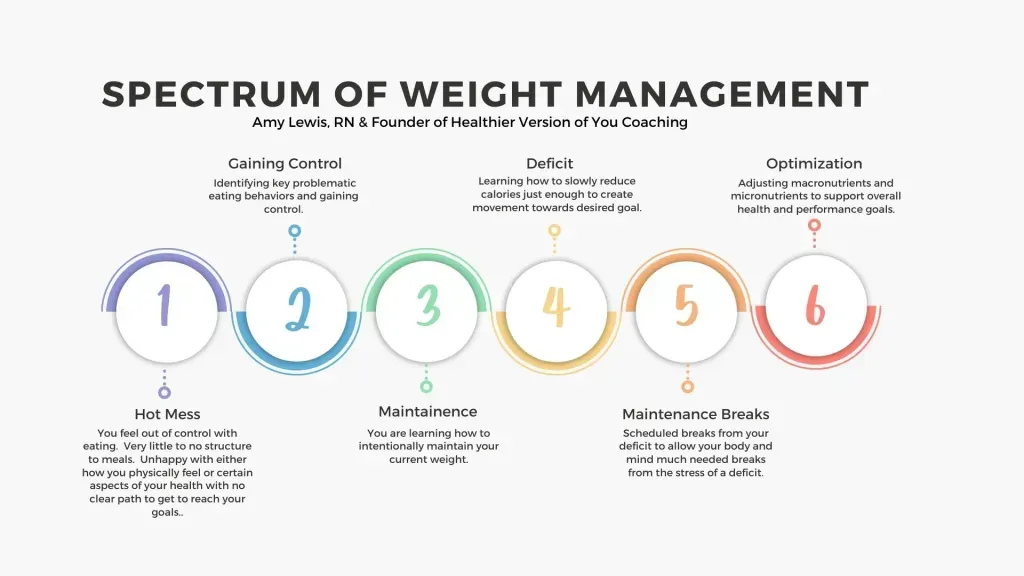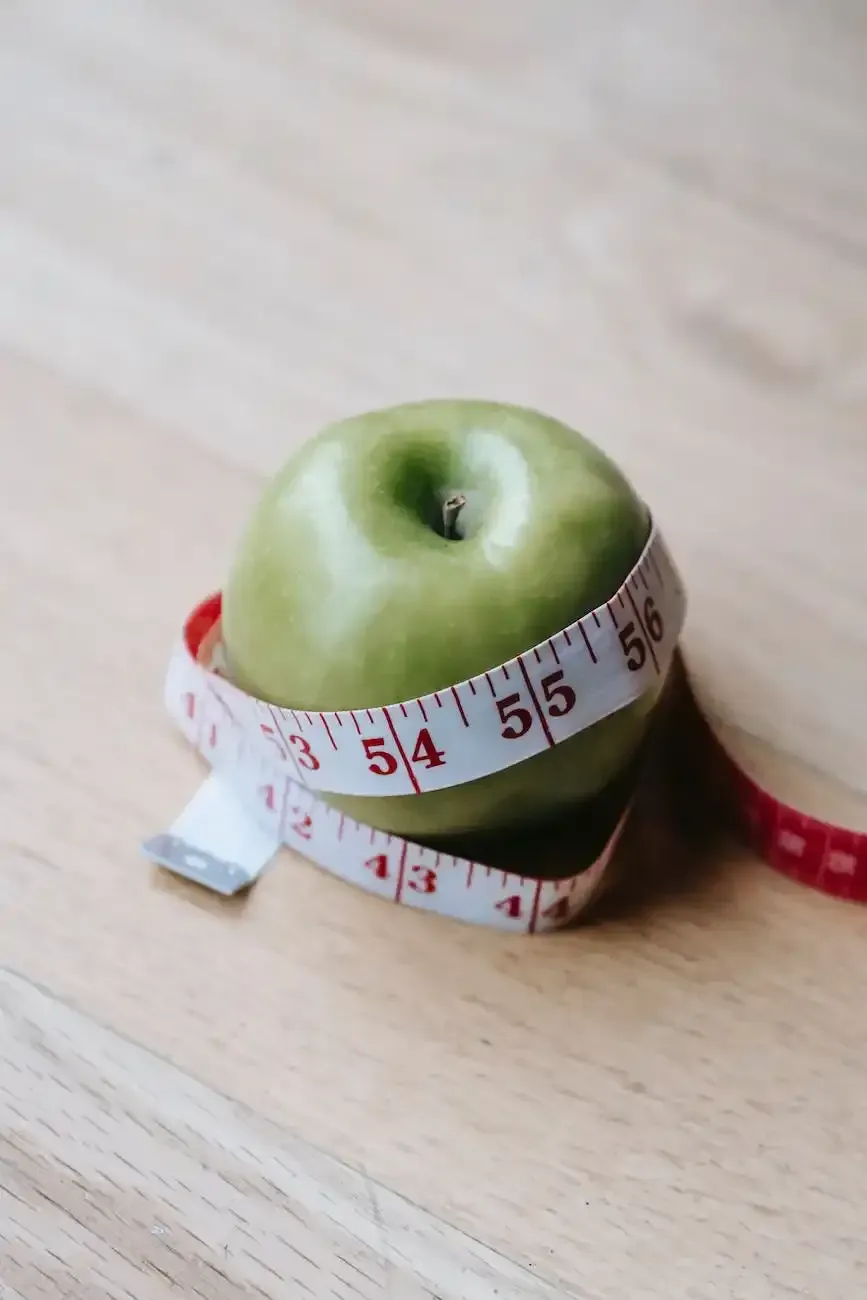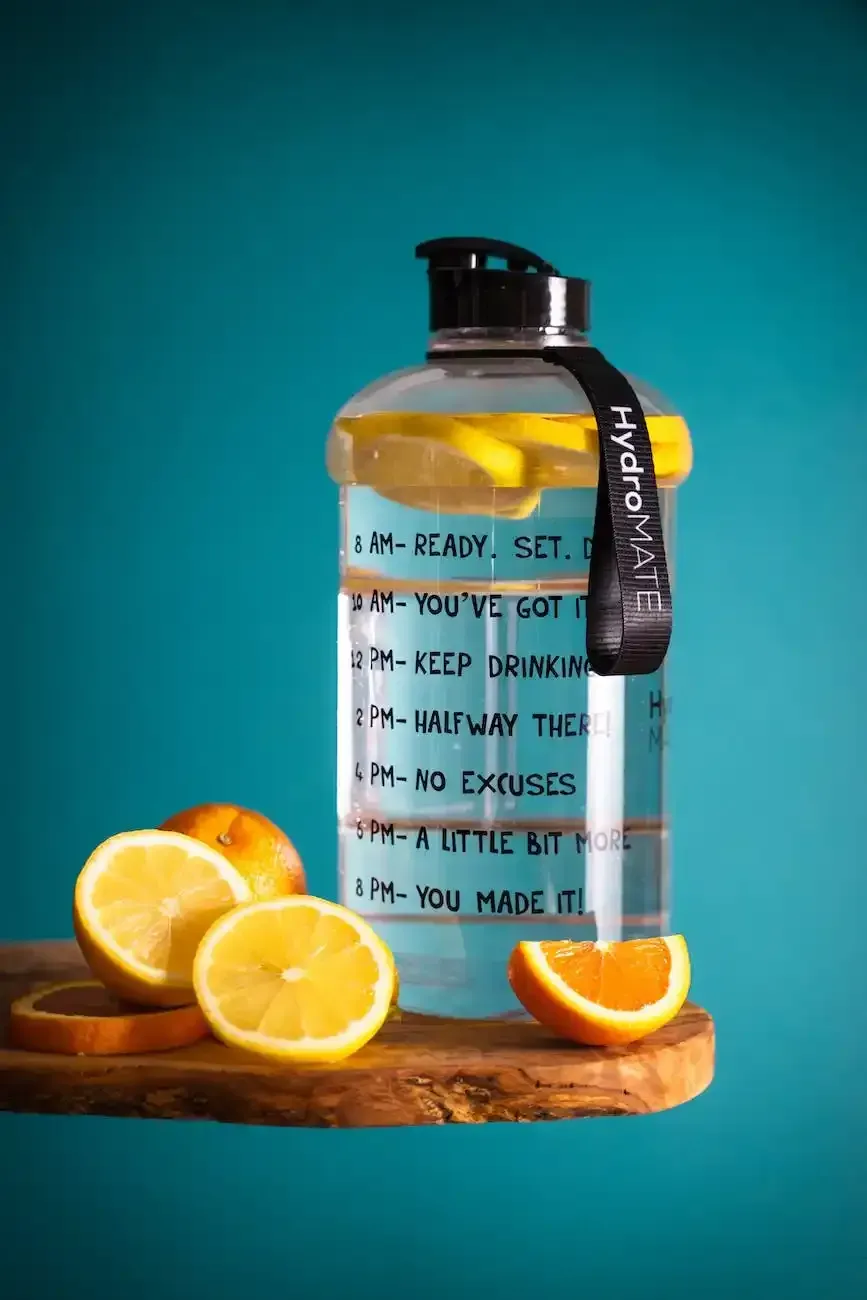Putting the Pieces Together: Spectrum of Weight Management
To put it simply, I’ve struggled with my weight my whole life. I grew up in a household that commercialized weight loss programs were part of the norm. I was a teenager in the 90’s when “Fat-free” everything started to become the diet trend, then quick-fix rapid fat loss programs were all the rage, diet pills like Hydroxycut, and shakes like Slim Fast would fix our weight issues.
I toggled between a pattern of strict control over my eating to zero control. I’d follow all the rules and if some restriction was best then more must be better right? That pattern continued up until I was 40! Decades of yo-yo dieting cycled me up to my highest weight (pregnancies included) of 217 pounds.
This last time I remember vividly, I got to the point that I knew I needed to go on another diet and I truly didn’t even know which one, I felt like I had tried them all and it felt like nothing worked for me. It’s like there was something I wasn’t getting, was I just destined to be overweight? Truly it didn’t make sense to me, all the things I had tried and the many times I had tried them it never seemed to stick. I understood the concept of making it a lifestyle change and a mindset but in practical terms I really didn’t know what that meant because I clearly wasn’t able to make that happen. I wanted it desperately but it just wasn’t sticking for me.
It’s like this giant puzzle of life, I had a lot of the other parts figured out or were only missing a few small pieces but the health and nutrition part that I felt so many other people had figured out but mine was missing this big section, I felt like I had a big question mark on it. Regardless I needed to do something, the trajectory I was on left me terrified and even though I didn’t know how I was going to do, I truly didn’t know what else to do.
I jumped back to my old toxic friend “calorie counting”, and met up with her just as terrible friend, “hours at the gym”. I would spend at least 2 hours, 4x/week doing moderate-high intensity cardio and eating 1200 calories/day. I obviously saw weight loss, but I also found it challenging to sustain, this was honestly the only thing I knew to do. I just went right back to my old toxic relationships because I didn’t know better. I didn’t even realize the disordered eating patterns I was in. Restrict and binge cycling, emotional eating, I looked at the scale to judge my efforts, not realizing eating out didn’t have to equal and indulgent experience every time, no carbs, no sugar, no….. so many things that I didn’t even think to question. It was about this time, shortly after I started that I was introduced to coaching and slowly the pieces of the puzzle started to appear, at times I still didn’t know how to put them into place but I at least had something to work with.
One of the biggest pieces I learned in the process is that there is so much more to weight management than on or off a diet. Weight management is on a spectrum and my old version of dieting was to go from one extreme end of the spectrum to the other. Not realizing all the levels of managing weight that reside in the middle of the spectrum. Had I recognized these different levels and started to learn the skills of each level, it would have saved me from years of yo-yo dieting and disordered eating behaviors.

The best way to utilize this is to find where you are on the spectrum. We all are somewhere from 1-6, whether we realize it or not we are always on this spectrum. I find most of the women I coach (and when I started) are at Level 1, maybe 2. Our eating and nutrition feels out of control, no rhyme or reason just what we see or whatever we want to eat, we eat. We feel terrible not just physically but mentally as well. Bloated, stomach issues, fatigued, exhausted, mentally drained and emotionally beating ourselves up because we know what to do but we aren’t doing it and the thought of starting another diet feels overwhelming.
Level 2 is where we start to gain some control. Dealing with our biggest problem areas first, like eating in secret, binge eating, restriction, emotional or stress eating, and so on. These are the things that even if we were to successfully push these aside to lose the weight, these problematic behaviors will quickly reverse any and all progress at a scarily impressive pace. These typically flare up when people are dieting, so any weight loss accomplished, your body is primed and ready to put on fat, you restrict to a point of eliciting these behaviors and the weight piles on faster than you can imagine. We have to learn the skills to control these behaviors first and foremost because if/when these behaviors return we need to know how to control them quickly to prevent rapid weight gain. Nothing is more devastating than working so hard to lose weight to have it quickly return. This is why you must first learn to control these behaviors.
Level 3 is all about learning the skills required to maintain your weight. This may come with getting your problematic eating under control in Level 2 but that is not guaranteed. It is extremely beneficial to spend some time learning the skills required to maintain your current weight. In learning this skill you can ensure you will never gain more weight than you currently are. As devastating as it was to see the scale read my highest weight ever, and as much as I wanted to believe it was my highest weight, when I started I had nothing to prove that I wouldn’t gain beyond that weight. To be brutally honest with myself I had only seen my weight get higher and higher, I was under no false illusions that I didn’t have the potential to gain even more. I knew if I jumped into a deficit and it backfired like it had so many times before, I’d most likely gain weight and see an even larger number. If I can’t maintain my current weight, there is no chance I will maintain a lower weight. It helped to know that in practicing maintaining my weight I was protecting myself from ever reaching a higher weight.
Level 4 is where the weight loss can begin. Now that I knew how to maintain my current weight I knew that if I was able to lose weight or if it went completely haywire, I knew I wouldn’t gain back even more. I slowly slid my way down in a deficit. If I had gone too far down and elicited any problematic eating behaviors, I then would let go of the deficit and slide back to Level 2 skills to get it quickly under control, then make sure I could maintain and then attempt a deficit again but with the knowledge of the last attempt.
This is a process I will be doing for the rest of my life, I will constantly be in a state of sliding up and down this weight management spectrum. The more mindful I am and practice these skills the better I can course correct and get back on track. As much as we all would love to reach our weight loss goals at a record pace I knew what would happen if had that rapid weight loss/fast mindset, I have lived that out my entire adult life. Instead I adopted “the same or better” mindset. As long as I am the same weight or better than I’m moving the right way. We severely overestimate what we can do in a year and underestimate what we can do in 3 years. I lost 30 pounds my first year, then 10 pounds each year after that for a total of 60 pounds lost. Imagine if I gave up because I wasn’t losing weight fast enough that first year, or even second year, where would I be now? I appreciate we want to get out of the pain of being overweight but ultimately that thought cycled me up to my highest weight ever. I needed to learn to be ok with going slow, not saying I loved it but I was terrified of the alternative, as long as I was the same or better I just kept going.
Level 5, once you find a good place where you can lose some weight and keep problematic eating behaviors in check, then you focus on maintenance breaks along the way. It is not good for your emotional or physical health to be in a constant state of deficit calories. A deficit creates stress on the body and mind. Deficit cycles should be a clearly defined date on the calendar and not reserved for when you get to your goal weight. It’s great practice in not only maintaining your weight but maintaining your new lower weight. You are practicing what life will be like living and maintaining this weight for the rest of your life. What good will it be to go lower if you can’t maintain lower?
PLUS, great added bonus, this concept of maintenance breaks has been researched and tested and been shown to have equal and greater results than constant dieting alone. Logically speaking our bodies are impressive organisms that can adapt, we know that our metabolism will slowly start to slow down if we constantly feed it less. When you slide your calories back up to maintenance then it will start to regulate back up as well. Then you slide back down and initially because it is running more efficiently you will see a larger loss than prior to the maintenance break. Factoring in these breaks is important on many levels.
And level 6 is all about optimizing nutrition. Although we know that adjusting macronutrient ratios and timing of meals is helpful in other levels, the key focus and driving factor is calories at that point in terms of weight management. Once you have found a good groove for managing weight it is a great time to then focus on optimizing your nutrition and decreasing the stress poor nutrition places on your body.
Each person is unique and there are different levels that will come easy to some and others they will need to spend more time learning those skills. I found in previous attempts at weight loss I was expecting to jump from Level 1 to Level 4 or 6 and then wondering why I wasn’t ultimately successful. I hadn’t learned the key skills along the way to support the outcomes of those levels. And whenever those levels felt overwhelming, I could have just slid down to the skills in Maintaining or Gaining Control instead of back to a Hot Mess and allowing my weight to spiral out of control.
There are many other mindset and skills I needed to learn along the way, and am still practicing and learning. I know this was large piece of my puzzle that was missing and I hope this helps to give you some pieces to work with to fill in your puzzle too.








